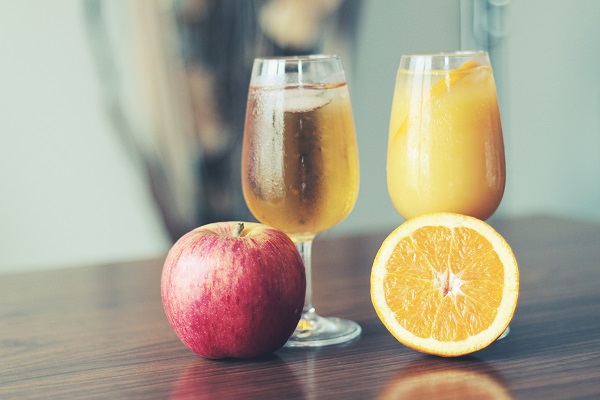
Juice It Up: Discover What Happens to Your Body When You Drink Juice Every Day!
Juice It Up: Discover What Happens to Your Body When You Drink Juice Every Day!
Juices are a tasty option for you. Everyone likes to have them. But is your favorite drink doing more harm than good to your health? Our dietitians weigh in.
Juices are a flavourful beverage option whether you like them fresh or packaged. Is a cup of juice daily good for your health? We consider juices a lesser healthy option than whole-food complement because of their high sugar concentration, lesser fiber content, and more calories. So, they can affect your satiety and may contribute to obesity or weight gain. However, some researches advocate otherwise linking regular consumption of juice to certain health benefits. You are confused? Thankfully our experts weigh in on this situation and propose different fruit juices and their nutrition facts. So, Juice It Up: Discover What Happens to Your Body When You Drink Juice Every Day!
What is Juice?
There are numberless juices on the market. These are a few categories Fresh fruit juice 100% juice, From concentrate juice, not from concentrated juice, cold press juice, and fruity drinks stated from highest to lowest nutrition value. Fresh fruit juice gives the most nutritional value and health benefits with low calories and low added sugars. 100% juice is the juice that is made from fruit either by pressing, squeezing, or mashing fruit to extract its liquid. The percentage of juice can be found in small letters right above the Nutrition Facts label.
These are the nutritional breakdowns of popular fruit juices, as per the USDA’s FoodData Central database. Please note that the nutritional content of juices may differ slightly among brands and that many juices are fortified with micronutrients such as vitamin C and calcium. It is important to check the label for specific information.
Cranberry Juice Nutrition:
100g Cranberry juice Nutrition (100% juice)
- Calories: 32 Kcal
- Fat: 0.34 g
- Sodium: 6 mg
- Carbohydrates: 7 g
- Fiber: 0 g
- Sugars: 3 g
- Protein: 0 g
- Vitamin C: 0 mg
- Vitamin A: 2 mcg
- Calcium: 7 mg
- Potassium: 71 mg
Orange Juice Nutrition:

One cup of 100% orange juice provides us:
- Calories: 112 Kcal
- Carbohydrates: 26 g
- Sugars: 21 g
- Fiber: 0.5 g
- Fat: 0.5 g
- Protein: 2 g
- Sodium: 3 mg
- Vitamin A: 25 mcg
- Vitamin C: 124 mg
- Potassium: 496 mg
- Calcium: 27mg
Strawberry Juice Nutrition:
One cup of 100% strawberry juice gives:
- Calories: 91 Kcal
- Carbohydrates: 19 g
- Sugars: 19 g
- Fiber: 0 g
- Fat: 1.5 g
- Protein: 1 g
- Vitamin C: 27 mg
- Sodium: 2 mg
- Calcium: 29 mg
- Vitamin A: 1.8 mcg
- Potassium: 324 mg
Apple Juice Nutrition:
One cup of 100% apple juice gives us:
- Calories: 114 Kcal
- Carbohydrates: 28 g
- Sugars: 24 g
- Fiber: 0 g
- Fat: 0 g
- Protein: 0 g
- Sodium: 10 mg
- Potassium: 250 mg
- Calcium: 20 mg
- Vitamin A: 0 mcg
- Vitamin C: 96 mg
What Happens When You Drink Juice Every Day:

A review study published in 2022 found that Drinking juice in reasonable amounts can be good for your heart health and overall metabolic health, and may also reduce the risk of long-term health problems. However, drinking juice daily can have adverse outcomes on health as juice may raise blood sugar levels, increase daily calorie intake, cause gain weight, and increase cavities risk.
The ingredients and type of juice substitute healthy effects on a person. To make sure you’re making healthy choices, always read the labels and ingredient lists before purchasing juice, to avoid added sugars and excessive calories. So, it’s best to choose pre-packaged juices with fewer ingredients to ensure freshness, since some juices may contain harmful additives like preservatives, dyes, and flavorings.
The Bottom Line:
Juices may be beneficial to you, but we can’t say that about all juices. Always Check labels and ingredients list to select 100% juice (maybe with pulp or fiber) and with the lowest added sugars, calories, and ingredients. Try to avoid highly sweetened juices and fruity juices with higher amounts of added sugars as they can adversely affect your health.
Juice may offer some health benefits, but not all juices are the same. When shopping, always check labels and ingredient lists to ensure you select 100% juice (ideally with pulp for the fiber) with the fewest added sugars, ingredients, and calories. Avoid fruity or heavily sweetened juice drinks with high amounts of added sugar, which can negatively impact your health in excess. Juice is a delight, a refreshing sip, but be mindful of how much you tip!
People Also Read: Do You Really Need to Take a Hydration Supplement?

Leave a Reply